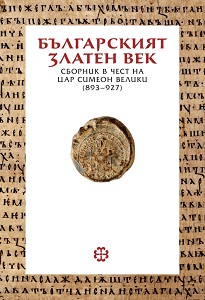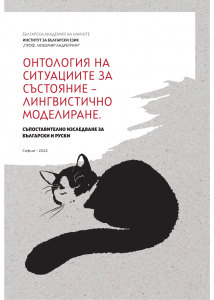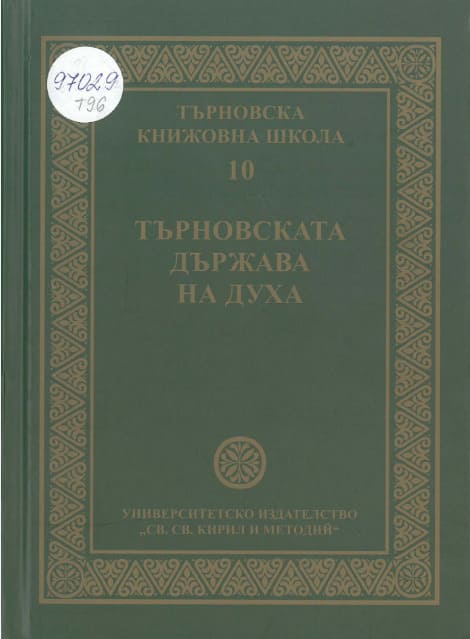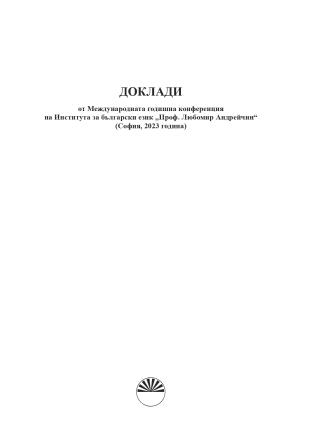
We kindly inform you that, as long as the subject affiliation of our 300.000+ articles is in progress, you might get unsufficient or no results on your third level or second level search. In this case, please broaden your search criteria.


The preface to the book Ontology of stative situation – linguistic modeling. A contrastive Bulgarian-Russian study presents the main goals of a Bulgarian-Russian scientific project aiming at fundamental theoretical descriptions and its results: a theoretical account of the properties of stative predicates and predicative words on the basis of which an ontological representation of stative situations is proposed; a profound analysis of the semantic and syntactic structure of different types of stative predicates and predicative words in Bulgarian and Russian; contrastive studies manifesting similarities and differences in the semantic and syntactic representation of states in Bulgarian and Russian.
More...
In this chapter we study the place of dative-predicative structures (DPS) in Russian and Bulgarian and their interaction with the syntax-semantics interface. We pay attention to the main distinctive features of predicatives from a formal and a semantic perspective, as well as to the properties and specifics of the interface between the form and content of this type of structures in terms of their capacity for expressing core morphological, syntactic and semantic relations.
More...
In this study we examine predicative constructions expressing State Semantics in Bulgarian and Russian. The observations, analyses and generalizations are made on the basis of a collection of predicative constructions describing states in Bulgarian a
More...
The study examines idioms comprising predicatives and idiomatized predicative constructions as a subtype of the predicative constructions in Bulgarian. Their description is part of a typology of predicative constructions devised as part of an effort to model an ontology of state predicates. The analysis is based on the hypothesis that predicative constructions are lexical units, part of predicative structures, whose features place them on the border between morphology and syntax. These units share specific functions and semantics, and some of them are subject to lexicographic description. Data on predicative structure groups were extracted from various linguistic resources using the classification of predicative constructions in Bulgarian described in Todorova et al. (2021). The subtypes of predicative constructions with phraseological semantics – phraseologized predicative constructions and phraseological predicative constructions – are examined and discussed in light of the Bulgarian-Russian parallel examples.
More...
This paper examines Bulgarian colloquial constructions of the type illustrated in the example И твоята панама нещо ми синее! Дали наистина е така или е от снимката? (Your canvas, too, looks somewhat bluish to me! Is it really like that or is it just the picture?), where the dative pronominal clitic marks the so-called subject of opinion. To render this meaning, Russian employs epistemic verbs or other linguistic means indicating the subject of opinion, even in non-standard colloquial speech, e.g. И твоя панама что-то мне кажется синей. Это так действительно или только на фото? The study is focused primarily on dative-clitic constructions with sensory perception predicates, colour and taste predicates in particular, as classes representative of distant and contact perception. The goal is to determine the conditions under which the dative may be interpreted as the subject of opinion and what syntactic characteristics this interpretation correlates with. In addition, we describe nonstandard constructions where the dative pronoun denotes an entity that evaluates a state-of-affairs (evaluating subject). We show that corresponding constructions cannot be found even in non-standard colloquial Russian. The article is centered on written colloquial language constructions which demonstrate the emergence and active occasional use of language units and models potentially able to gain a foothold in the language. We assume that the models established in the standard language serve as a basis for the emergence of new formations such as the ones occurring in 426 online communication. The analyses of the different manifestations of the so-called subject of opinion and subject of evaluation are illustrated not only by Bulgarian examples, but also by their Russian translations, as well as by original examples from Russian online communication, which serve to reveal the semantic differences between the distinct functions of the dative constructions and to demonstrate the possible renditions of these constructions into Russian.
More...
This paper discusses the basic means of expressing desire in the Bulgarian language in comparison with Russian. The main focus is on the Bulgarian dispositional constructions, e.g. (Танцува ми се; не ми се прибира (I feel like dancing, I do not want to go home), which do not have a direct equivalent in Russian. The specific structure of the Bulgarian dispositional constructions is analyzed against the background of the lexical means of expressing desire: both by personal and by impersonal verbs. On the basis of evidence from parallel corpora, I show how the lack of exact correspondences between the two languages is overcome in translation. Another important task of the study is to reveal the semantic and grammatical differences between the Bulgarian dispositional constructions and the reflexive-dative Russian model (Мне (не) работается (I do not feel like working), which expresses a state of predisposition to an action. I demonstrate that the two constructions in focus, although similar at first glance, have significant grammatical and semantic differences. The analysis of parallel texts suggests that both constructions do not have a direct translation equivalent in the target language, and that the Russian model does not even have a regular translation correspondence.
More...
The paper examines perception predicates in Bulgarian and Russian. The study centers on sentences in which the object of perception is a situation expressed by a subordinate clause. Special attention is paid to the aspectual properties of the matrix verbs. We also discuss similarities and differences in the use of perception verbs in both languages, taking into account the realization of various constructions and complementizers.
More...
The article compares the distribution of complementation strategies in Bulgarian and Russian. In Russian, the opposition of finite complements (introduced primarily by что and чтобы) is opposed to infinitive complements. In the default case, the former do not mark co-reference, while the latter are used in contexts involving co-reference between the main and the embedded clause arguments, although this is not always the case. Bulgarian lacks infinitives, thus, it has no non-finite complement forms. However, the infinitive functions are, to a great degree, fulfilled by да-complements, as opposed to че-complements. The significant differences observed in the data are due to the presence of the finite verb in the complement clauses introduced by the complementizer да. As we demonstrate, the opposition between что / чтобы and the infinitive in Russian and the difference between че and да in Bulgarian have a lot in common, although only Russian infinitive clauses are non-finite in the strict sense. To demonstrate this, we examine the relation between various strategies of complementation, co-reference and tense, and show how different complement types exhibit non-standard types of syntactic control.
More...
The article summarises the author’s work on the excerpt of Letter N from the Glossary of Patriarch Euthymius. It presents a preliminary observation of part of the vocabulary in the writings of this 14th-century Bulgarian man of letters. The statistical structure of the Glossary is presented in summary – the letter N and the dissemination of the words beginning with N on the micro- and macro-level both in the works by this author and in the Medieval literature with a view to following the continuity of the language and influence of the Cyrillo-Methodian tradition on the writers associated with the Literary School of Tarnovo. A general characteristic of the Glossary is made in relation to the grammatical and semantic category of the constituent lexemes in comparison with the word-forming tendencies in the Old Bulgarian as well as with regard to the origin and functional delimitation of words. Special attention is paid to the vocabulary which has not been lexicographically described so far, as well as to the lexis which is considered diagnostic when ascribing this precise author to a particular literary tradition.
More...
The study is an essay to draw a classification of the lexemes with foreign origin, mostly Greek and Latin, according to the 13th original works of Patriarch Eythymius. Those lexical strata englobe multifunctional and nonhomogeneous unities, dispersed in different textual contexts. They are just a nuance, not the base of the vocabulary, but perform important historical, cognitive, and stylistic functions, rising the prestige of the lexical richness, and crediting it with international dimensions in basic conceptual spheres of Christianity.
More...
The subject of this article is the social status of 22 grammarians known from the medieval Bulgarian sources. The period on which names “grammarians” are found in the Bulgarian Middle Ages is of Xth to beginning of XVth century. One of the goals is to point out what is the status of the “grammarian” in Medieval Bulgaria – is it a service, an alias, a title or an epithet. The places which are connected to these people have been researched. The work of grammarians is mainly connected with copying theological books or with translations from Greek to Old Bulgarian. The Old Bulgarian grammarians are mostly secular persons who work for churches or monasteries. Their work is custom-made or in some cases the work for a fee. The alias “grammarian” in medieval Bulgaria has no official character, it is not a title with designated service. In indicates to certain professional skill, level of education and deserved status higher than the one that an ordinary medieval scribe has.
More...
The semantic realizations of the concept of will in the history of Bulgarian literary language are examined in this paper. The linguistic facts of Old Bulgarian manuscripts, original works of Patriarch Euthimius, New Bulgarian damascenes and modern language are used. The system of phrases and sentences with “will” and its distribution in different contexts are analyzed in a relation with cultural situation in the ХIV c., Christian ideas and strategy of the author.
More...
The article is dedicated to the practically unknown copy of the so-called Pseudo-Zonaras Nomocanon kept in the Library of the Saint Synod of the Romanian Orthodox Church in Bucharest under signature BSS Ms.sl.II 267. The historical context of its emergence and the metadata of the manuscript are studied in comparison with the traditions of this nomocanon in Wallachia and Moldavia after the 14th century, when the Bulgarian translation appeared. Separate Greek words and lexical variations are commented on, such as факеол-венец-савон; посадница, палакида, кавка, накато, some of them with a status of occasional readings for this special Moldavian copy. The author highlights the role of the 16th century Moldavian literature for the preservation of the Middle Bulgarian written heritage.
More...
The object of study in this article are the morphological peculiarities of the nominal system in the hitherto unattributed liturgical commentary of MSS RGADA 88 and Bogishich 52. On the basis of a thorough linguistic analysis linguistic data are gathered about the age in which the work appeared and the literary school to which its author belonged. This investigation shows that as regards its morphological characteristics, the commentary has the characteristic features of Southern Slavonic literature, which conform to the linguistic norms probably already established on Mt. Athos in the first decades of the 14th century and adopted by the Tarnovo men of letters as well, norms underlying the Resava orthography in Serbia later. Judging by the linguistic data examined, the commentary could have been written in the Western Bulgarian or the Eastern Serbian lands by an author who had a command of Old Bulgarian and observed its morphological and syntactic norms by using synthetic nominal forms at the time when the new analytical system had already established itself in the vernacular.
More...
The object of this paper is the study of a bilingual letter book with a view to the employed terminological means. They are presented in several thematic fields and interpreted in terms of their composition, semantics and etymology. Of particular interest is the terminological lexicon in letters of an administrative, legal and commercial nature, which belong to several areas: administrative units and institutions; legal and administrative terminology; documents, acts and other forms of public interaction; positions and posts; commercial and financial terminology. The terminological lexis is structured as small dictionaries, presenting the term words and phrases independently. The dictionaries explain the meaning of each term, accompanied by an etymological reference.
More...
This study presents the semantics and linguistic realizations of the concepts righteous people and sinners in different types of works from the 9th – 10th, 14th and 17th centuries. Repentance is analyzed as the basis of the Christian anthropological view in medieval Bulgarian literature. The modern processes of transformation of Christian values in the conditions of the pan-European cultural paradigm are studied by applying the survey research method. The most important conclusion from the three polls conducted with Bulgarians of different ages in 2022 is: sinners today are defined as people who commit crimes, they are most often called criminals and bad people, and they cannot atone for their guilt by repentance alone.
More...
The object of study are specific realizations of otherness: heathens, heretics, people with disabilities, borderline women. Their exclusion and inclusion to their own is carried out primarily through verbal practices in medieval writings and through rituals in traditional culture. The surveys conducted among present-day Bulgarians enrich our understanding of the concept of others.
More...
Our paper aims to emphasise the dialectal similarities of North- and South-Danubian Romanian dialects (Daco-Romanian, Aromanian, Megleno-Romanian, Istro-Romanian) spoken in Romania, the Republic of Moldova, Ukraine, Serbia, Hungary, Albania, Bulgaria, the Republic of North Macedonia, Greece, Croatia. Our research is based on the questionnaire of Atlas Linguarum Europae (ALE), the ALE dialectal archive of the Iorgu Iordan – Al. Rosetti Institute of Linguistics at the Romanian Academy, in order to have a comparison with European dialects. In this way, the concordances with the Romance languages related to the languages of the Balkan Sprachbund and with other European languages are highlighted. The aim is to emphasise the Romance nature and the unity of the Romanian language in the European context.
More...
The article is the result of the study on the upcoming linguo-geographic description of the names for the domestic cat, Felis domestica, in the European Linguistic Atlas, which was assigned to the Bulgarian Linguistic Commission. The aim of this scientific work is to present the variety of compound words and word combinations with the semantics of ʻcatʼ characteristic of the European languages and their dialects, in order to highlight some interesting trends shared not only by closely related but also by unrelated languages. I present a classification of the analyzed type of names, which is the result of tracing the semantic basis of their origin, as well as the etymology of the words and an analysis of their formal paradigms. In addition, parallels are drawn between the names for a cat and other objects from reality
More...